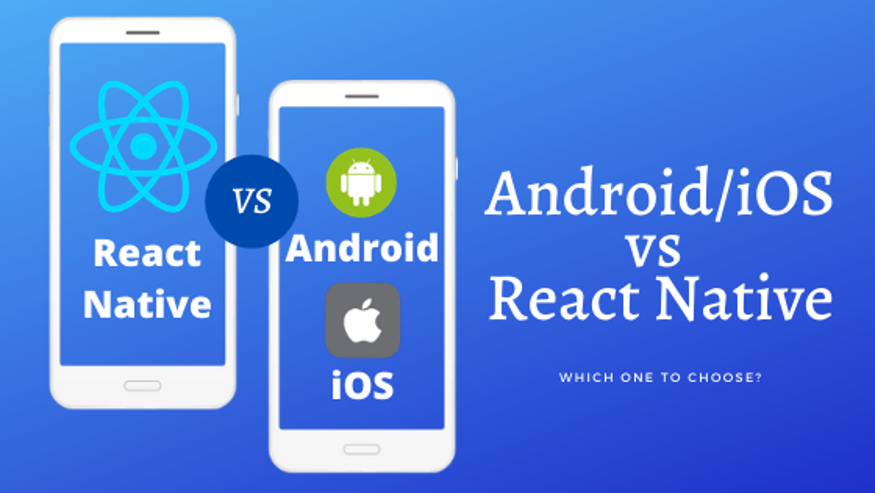One of the best, easiest, quickest and the most convenient way to reach customers today is via mobile apps, for which, businesses are putting all their efforts and finding ways that make them impressive enough.
The mobile app market is rising at rocket speed with the steady increase of mobile app downloads. According to the statistics, the record of 205.4 billion app downloads in 2018 is predicted to grow up to 258.2 in 2022, i.e. a 45 percent increase over five years. Such colossal growth is not only inspiring businesses to invest in mobile app development but is also encouraging tech enthusiasts to discover new and innovative ways to make the mobile app development process much better than it was yesterday.
Now, the only issue that was causing trouble was the developers were required to design and develop the same app for completely two different yet important platforms – Android and iOS as both have cut-throat users worldwide until Facebook released React Native, an all-covering universal tool which allows the creation of iOS and Android apps simultaneously and much quickly.
Also Read: Creating SQL Server Plan Baselines for Your Business
Today more than the battle of mobile apps and platforms between brands, the competition of frameworks on which they are made are even more. With too many frameworks available presently, to decide upon which one is the best for developing a mobile app is the hardest nut to crack but don’t worry, by the end of the article you will have a decision. So, let’s understand first what is React Native App Development and how is it different from the Native Apps structure.
React Native
Originally developed for an internal hackathon project by Facebook developers, React Native, a cross-platform mobile development framework, was later made available to the public in 2016.
It is a JavaScript open-source framework based on JS and React which includes a JS library for creating UI that ensures the creation of perfect UI/UX design that works for both Android appsas well as iOS apps.
How does it work?
A single JavaScript codebase is compiled to a mobile app indistinguishable from an iOS app built using Objective-C/Swift or an Android app using Java/Kotlin. The code is then shared across these two different codebases, but for the design elements, the native components of each platform are required, hence the name React NATIVE.
Some of the apps sailing on React Native framework are of course Facebook, Instagram, Uber Eats, Pinterest, Salesforce, Wix, Bloomberg, KFC, Vogue, Wallmart, even Microsoft-owned Skype which uses React Native instead of their own Xamarin. Surprising, isn’t it?
Now, let’s understand what are features that make React Native so popular?
1. Time, Resources, and Cost Savings
As mentioned before, due to the shared codebase structure of React Native, the need for developing two different codebases for Android apps andiOS apps is eliminated in it which leads to lower development time and savings of valuable resources as well the cost of development as you are only required to hire or outsource the app-building to those fluent in cross-platform development.
Moreover, if the need arises to rebuild an app due to some insignificant changes, the “hot reloading” feature in React Native makes it easier as it allows to inject and rebuild only the changed modules, and not all the code every time, further, with its “live reloading” tool the building process gets automated which means React Native will automatically rebuild every time the code changes so that you don’t need to do it manually each time.
In short, React Native guarantees faster mobile app development without losing quality or productivity in almost a half time and cost of theMagento app development for Android or iOS.
2. Flexibility with Open Source
React Native, being open-source, benefits by allowing you to remain flexible while coding. You can inspect the code, fix bugs or add new features for improvement all with ease in it.
3. Easy to Adopt
For web developers who are well-versed with React or Javascript before or those who have just stepped into mobile app development, in both cases, the react native framework serves apt as it is easier to learn and adapt. It is very straightforward and most of the concepts are similar to that of JavaScript which you can work your way through. Hence, for developers aiming a transition to mobile app developer from a web developer, React Native will make it a smooth one.
What is Native Mobile App Development and What are its Pros?
Native mobile app developmentis like a traditional way of building apps. It is about building an app from scratch for one operating system, either iOS or Android. SinceiOS apps are written in Swift and Objective-C and Android apps in Kotlin and Java, Native mobile app developmentrequires developers with programming skills dedicated to each Android and iOS separately.
Now if we take a look at pros of native apps, they provide the following:
- High performance
- Supports all APIs
- Bigger community
- Better integration with hardware functionalities
- Potentially fewer bugs
- Easy error detection
- Robust language
- Third-party libraries
So, Whom to Pick? React Native or Native?
Both the frameworks have their pros as well as some cons which makes it difficult to decide which one to choose for your mobile app development as it also depends upon the nature of the application you are making, your business goals, and overall vision of your mobile product. To help you decide better here’s what you can do.
React Native is a perfect suit when:
- You are building a simple and uniform app.
- And you have a tight deadline and want to deliver the app quickly.
- You really want to go cross-platform.
- If you have a lower budget for app development and a small development team
- You want to enter the market at the earliest as possible.
- If you are aiming to create a social media app like Facebook or Instagram.
- You are planning to use Facebook ads in your app.
- If you want to develop e-commerce or any app without sacrificing its quality, efficiency, and performance.
- Your developers have a strong React/Web development experience.
- You want your app to have a long lifecycle with further major developments.
Concluding remarks
There’s nothing wrong with Android app development or you are not going to suffer any loss with iOS app development, just that going cross-platform by developing react native apps will help you achieve your business expectations a bit more easily, quickly and efficiently than the native app development.
Whatever it may be, your decision must be entirely dependent upon your long-term goals, budget, scope and timeframe. So, React Native or Native, no matter what you pick, MobiCommerce is there to help you out as it has an in-house team of developers having extensive experience in developing mobile apps across all mobile platforms including React Native App Development. Get in touch now!




